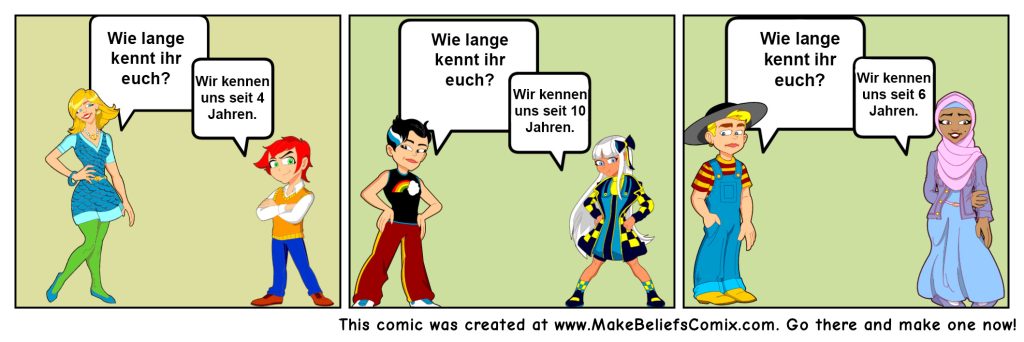4.1 Eine gute Freundschaft

Hallo allerseits.
Zum Aufwärmen machen wir unseren Tagesminiplausch und eine Wiederholung.
Wiederholung
In the previous lessons you learned how to express your clothing preferences and how often you and others wear items of clothing. Let’s review.
Jetzt bist du dran!
Lektionsüberblick
Learning about someone’s friends can tell you a lot about that person. As you get to know people in Germany, you can talk about your friends back home. You have already learned enough German that you can now give a basic introduction and description of your friends. In this lesson, you will recall past lessons in service of describing your best friend. When you talk about your best friend (or any friendship), in addition to stating how long you have known each other, you may want say how you know each other, which is the subject of this lesson. In the end, you will be able to 1) talk with someone about the lengths of your respective friendships and 2) ask and say how you each know your best friends.
Was weißt du schon?
| Noch nicht start klar?
Du kannst immer auf die gleiche 1010-Lektion zurückgreifen! |
Not confident about starting this lesson?
You can always review the same Lektion from 1010. |
1) Wie lange kennt ihr euch?
Here are the questions again with a shorter version of the question: How long have you known him/her/them? Read and listen to the examples below. Repeat after the audio until you no longer need to look at the text.
| Wie lange kennst du schon deinen besten Freund?
Wie lange kennst du schon deine beste Freundin? Wie lange kennst du schon deina besta Freund*in? |
Wie lange kennst du ihn schon?
Wie lange kennst du sie schon? Wie lange kennst du xien schon? |
Read and listen to how Max talks about his best friend Meike.
 |
Ich habe viele Freunde, aber meine beste Freundin heißt Meike. Wir kennen uns seit fünf Jahren. Sie ist sympatisch und vernünftig. |
Another way to ask the same question is Wie lange seid ihr befreundet?
| Do you remember one way of answering the question “Wie lange kennt ihr euch?” or “Wie lange seid ihr befreundet?”
Ich kenne ihn seit 4 Jahren. — Ich kenne sie seit 10 Jahren. — Ich kenne xien seit 6 Jahren. |
Now let’s look again at the new way of answering the question. With this answer, you don’t have to know the gender of the friend.

🎥You can listen to a hit song by Nena called Du kennst die Liebe nicht (1985) that uses the word kennen. Follow along with the lyrics and notice how many words you understand!
Jetzt bist du dran!
Frankfurt am Main im Blickpunkt

Frankfurt am Main ist eine moderne Stadt in Deutschland. Sie ist bekannt für ihre vielen hohen Gebäude und wird manchmal „Mainhattan“ genannt. Der Spitzname „Mainhattan“ ist ein Wortspiel: „Main“ kommt vom Fluss Main, an dem Frankfurt liegt. „Manhattan“ ist der berühmte Stadtteil von New York mit vielen Wolkenkratzern. 14 der 15 höchsten Wolkenkratzer Deutschlands stehen in Frankfurt.
Frankfurt am Main is a modern city in Germany. It is known for its many tall buildings and is sometimes called “Mainhattan.” The nickname “Mainhattan” is a play on words: “Main” comes from the River Main, on which Frankfurt is located. “Manhattan” is the famous New York City district with its many skyscrapers. 14 of the 15 highest skyscrapers in Germany are in Frankfurt.
2) Woher wir uns kennen
If you are talking to someone about how long you’ve known your friend, what is a common follow-up question? You can think in English or your native language for a moment. How about, how do you know each other? Woher kennt ihr euch?
Let’s practice!
Remember: You can ask the question back by simply saying “Und du?”
Read and listen to how Meike talks about her best friend Max.
 |
Ja, Max ist mein Lieblingsmensch. Er is sehr intelligent und lustig. Wir kennen uns von der Uni. |
Where else might you know your friend from?
Kleiner Hinweis
Remember that at this level, second semester German, absolute precision is not important. That means you should pick an answer that most closely matches with how you know your best friend, instead of using a direct English translation.
With that being said, if none of these statements fit for you, talk to your instructor for a level-appropriate statement!
Let’s practice some more.
Jetzt bist du dran!
Zum Schluß
Using the modeled language in this lesson, write out a brief dialogue, introducing your best friend and asking your conversation partner about theirs. Here is Julia’s dialogue:
| Gesprächspartner: | Hast du eina besta Freund*in? |
| Ich: | Ja, sie heißt Sofia und ist 20 Jahre alt. Und du? |
| Gesprächspartner: | Ja, xier heißt Dominik und ist 19 Jahre alt. Wo wohnt Sofia? |
| Ich: | Sie wohnt in Laramie. Wo wohnt Dominik? |
| Gesprächspartner: | Xier wohnt auch in Laramie. Wie lange kennt ihr euch? |
| Ich: | Wir kennen uns seit 5 Jahren. |
| Gesprächspartner: | Und woher kennt ihr euch? |
| Ich: | Wir kennen uns von der High School und aus der Nachbarschaft. Wie lange kennt ihr euch? |
| Gesprächspartner: | Wir kennen uns seit 10 Jahren. |
| Ich: | Und woher kennt ihr euch? |
| Gesprächspartner: | Wir kennen uns von der Grundschule und vom Sommercamp. |
If you do not enjoy making up the dialogue for your conversation partner, you may have this conversation with Julia, since you know what her answers are. Alternatively, you can meet up with a classmate and work on this dialogue together.

*As you conclude this lesson, don’t forget to check Canvas!*

Media Attributions
- Image of Max from Grenzenlos Deutsch, GD Max.pgn_-211×300, licensed under a Creative Commons Attribution-NonCommercial-ShareAlike 4.0 International License.
- 4.1 kennen seit make-beliefs-comix
- Skyline_Frankfurt_am_Main
- Image of woman with glasses by vecteezy_image-of-a-girl-wearing-glasses_22968253 © Gear Digital Arts

